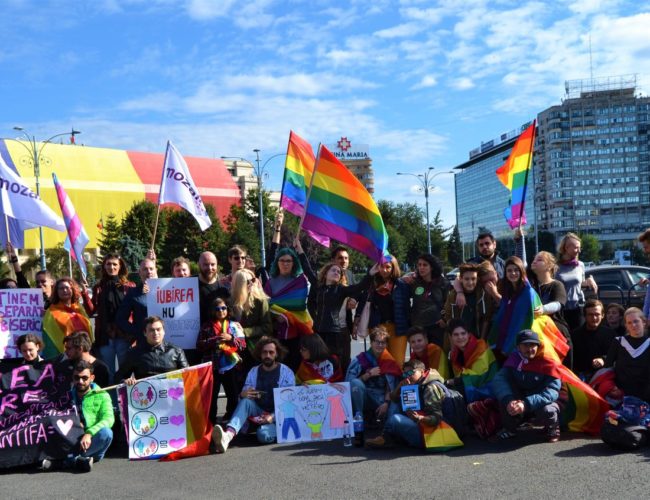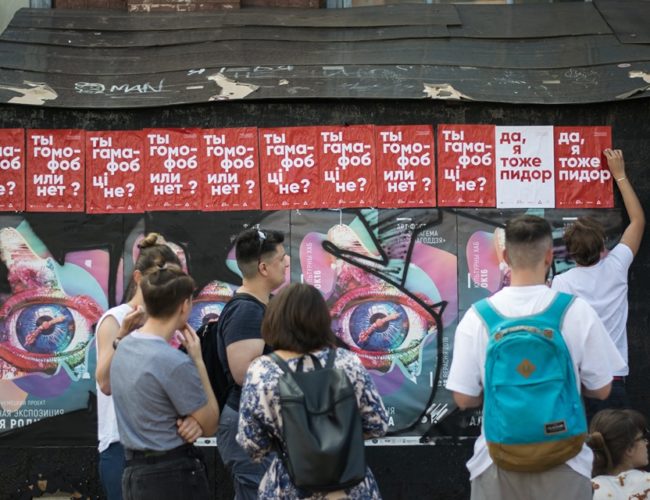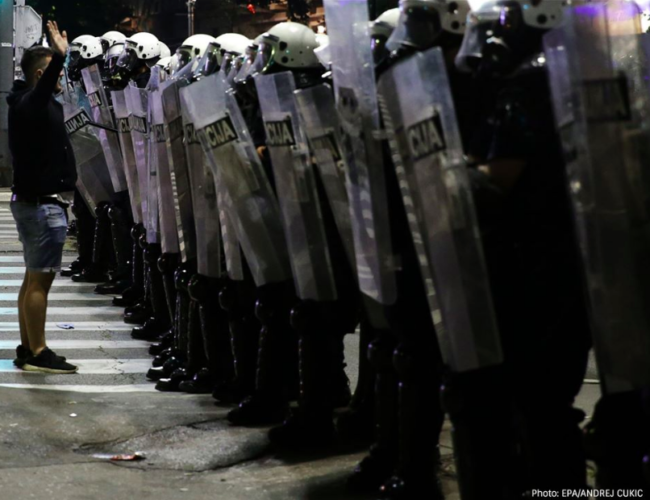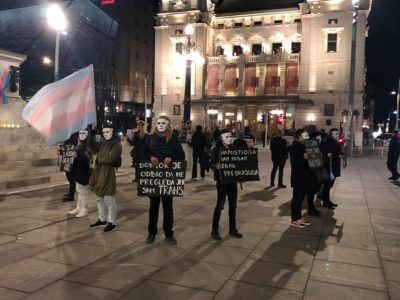Apologies, we are currently in the process of translating the Ulex site into Catalan and Spanish. Please be patient with us – this page will be coming soon!
With a ‘stunning democratic breakdown’ occurring across much of the Balkans, LGBTQI+ people are living within an increasingly overt hostile environment. We interviewed 5 activists from across the region to learn first-hand how resilience and resistance are being woven together within queer organizing circles.
By Lindsay Alderton
Nine years ago, when Eweryst Zaremba, a young trans activist from Poland, first showed up at the Ulex Project, it was to participate in a Sustainable Activism course in response to their own disillusionment and burn out. “I’d been immersed in grassroots anarchist organizing on the frontlines for years,” said Eweryst, “and it had gotten to the point where everything was framed with a sense of lack. Lack of connection in our groups and ways of relating, lack of prefiguration in our political organizing strategies, lack of capacity in our emotional availability or care for our bodies, lack of hope that things would change.”
The course proved to be transformative, and Eweryst took the learnings back home to SPINA, a grassroots trainers collective in Poland bringing tools for resilience to activists. Eweryst added, “Exploring the emotional dimensions of activism and group dynamics was new ground for many. It was quite a battle at times to bring these subjects into the awareness of social movements. But it’s worth it all the more with what’s happening in the region now.”
Fast forwards five years and Eweryst is now the project lead for Ulex’s LGBTQI+ psycho-social resilience and holistic security programme, bringing international workshops and trainings to LGBTQI+ organizations across Central and Eastern Europe, the Western Balkans and other post-soviet countries. “These are deeply troubling times across the entire region,” Eweryst explained, “with many LGBTQI+ communities facing outright hostility and violence. When we were conducting the needs analysis with groups across the region many challenges were very similar. Partially this is because of the share socio-political contexts and the history of being a part of the Soviet Bloc. There are also similarities across the region in the narratives being used to target LGBTQI+ people.”
 Protest against the Referendum to ban same-sex marriage in the Constitution in front of the Romanian Government
Protest against the Referendum to ban same-sex marriage in the Constitution in front of the Romanian Government
Although in many places awareness, tolerance, and inclusion are growing around gender identity and sexual orientation, political and societal responses vary dramatically from region to region. Across Eastern and Central Europe, amidst growing populist nationalism, a range of politicians are using anti-LGBTQI+ narratives to stoke resentments and garner support. These narratives, in turn, are leading to an increase in hate crimes, repressive laws, and intolerance with many LGBTQI+ people finding themselves having to fight for their right to exist.
“Across Turkey and the Western Balkans” says Amarildo Fecanji, Executive Co-Director of the Equal Rights Association’s for advancing LGBTQI rights and equality in Western Balkans and Turkey (ERA), “people have never been so exposed to so many queer friendly spaces online and in a few lucky spaces also offline. We have numerous opportunities to meet with others across the world, to make connections and to learn knowledge and share. And at the same time in our own region, in our lived experience of day-to-day life, we’ve never been so vulnerable”.
Amarildo helped co-found ERA five years ago, a regional network organization which now caters to around 67 LGBTQI+ organisations across the western Balkans and Turkey. He has witnessed the encroaching rise of populism with a correlation in the levels of repression of LGBTQI+ human rights and freedoms: “Though there’s no doubt that LGBTQI+ oppression continues to be both a European and Global issue, across the Western Balkans and Turkey we have our own particular set of historical and institutional influences. Right from the onset the strategy adopted by populist leaders has been to use public sentiments such as homophobia and patriarchalism and nationalism as tools to garner power, to be used in such a way that attacks any form of expression of diversity. These leaders are becoming increasingly less democratic and overtaking not just their parties, but parliament, the executive, the judicial and the media itself. They use tools of manipulation to attack civil societies and keep themselves in power.”
 ‘Kastrychnickaya’ – a public campaign held by LGBTQI+ activists in Minsk .
‘Kastrychnickaya’ – a public campaign held by LGBTQI+ activists in Minsk .
The posters on the wall says: “Together we are stronger than fear”
© photo by Anna Stekolenko
In their 2020 ‘World Freedom Report’ democracy watchdog Freedom House concluded that there was a “stunning democratic breakdown” across the 29 countries it surveyed from Central Europe to Central Asia. They even went so far as to state that Hungary, Serbia, and Montenegro could no longer even be called democracies. Findings from the report confirmed that antidemocratic leaders in Central Europe and the Balkans were hoarding power and corrupting due democratic process, whilst undermining institutions that protect freedoms of expression and association and the rule of law.
How the erosion of these civil liberties manifest across Central and Eastern Europe is widespread and diverse. In Turkey, for example, President Erdoğan declared in 2017 that the empowerment of LGBTQI+ people was ‘against the values of our nation’. This led to an outright ban for two years on all LGBTQI+ cultural events in the Turkish capital city of Ankara. The thousands of protestors who continue to congregate for PRIDE each year – banned across local authorities since 2015 – are met with police attacks, tear gas and plastic bullets. And across the border in Montenegro activists trying to organize PRIDEs have also been subjected to abuse and violence since their first event in 2013. Further across the region in Poland, the heart of Central Europe, events are even more disturbing, where leaders from the ruling Law and Justice part have called ‘LGBT ideology’ an imported ‘threat to Polish identity, to our nation, to its existence’. This has resulted in around 30 local municipalities becoming official ‘LGBT-free zones’, adopting resolutions which are openly hostile for anyone who is not promoting what is referred to as ‘natural family’ behaviors. Hungary too has politicians at the helm unafraid to use openly homophobic rhetoric, with leader Viktor Orban, ruling by decree following on from the coronavirus lockdown this year, ensured the passing of a bill in May 2020, which now makes it impossible for individuals to change their legal gender marker.
 Protesters in Serbia, July 2020 © photo by EPA/Andrej Cukic
Protesters in Serbia, July 2020 © photo by EPA/Andrej Cukic
For Marina, an organiser originally from Latvia but now working for the Cultuur en Ontspannings-Centrum (COC) in the Netherlands – one of the most well established LGBTQI+ associations in the world – the importance of enforced legal protections remains absolutely central.
“As an anarchist I find it really depressing that it would have to take for government to set a particular moral direction for the majority to follow. And yet regardless of my personal feelings, legislation really does makes a difference. With organisations that we’re working with in the Balkans – such as in Albania where they established an LGBTQI+ law which bans discrimination on the grounds of gender identity – even though there are still widespread feelings of homophobia, queer people speak now of moving from a climate of outright violence to being able to walk down the streets holding hands. This is a huge shift.”
Growing up in Latvia, now ranked 41 out of 49 countries in ILGA Europe’s Rainbow rating, but currently working in the Netherlands, Marina has first-hand experience of how oppression plays out differently for LGBTQI+ communities situated in Eastern and Western Europe. It is because of this she was encouraged that Ulex is focusing their series of LGBTQI+ resilience trainings towards Central and Eastern European activists. “When I heard about Ulex’s work I was like wow this is timely and needs to be spread as much as we can. Burnout is at epidemic levels and heightened from living in a post-Soviet context with a work ethic which prides itself on ‘working yourself to the bone’. Moving from Eastern to Western Europe I recognise that my own internalised homophobia plays out in a very different way to someone who’s grown up here.”
This view is reflected by Alexandru, a founding member and a trainer with MozaiQ, a grassroots LGBTQI+ community based organisation, in Bucharest, Romania. “When it comes to LGBTQI+ rights and acceptance there are big differences between Western and Eastern Europe.’ said Alexandru, “For even when there is a resurgence of far right or ultraconservative political movements in Western Europe, LGBTQI+ rights are seldom the battleground. Added to these tensions is the precariousness of an economic situation in Eastern Europe and the Balkans which further adds to the vulnerabilities of LGBTQI+ activism. It directly impacts our capacity and sustainability and makes us dependent on the sensibilities of the general public and through them the strategies that can be used against us.”
Many LGBTQI+ organisations across Central and Eastern Europe are struggling to access funding, with many finding their finance channels cut off entirely. Even if there is money available this can come with its own risks, with increasing levels of vulnerability arising with visibility. “As soon as you receive government money you’re at risk from receiving more searches, more desk checks, more investigations into the way you keep your books” says Amarildo. “These are just a few of the kind of repressions that a lot of organisations would rather avoid.”
Across the border in Belarus, Nasta, who works with MAKEOUT, a LGBTQI+ community aimed at creating collectives spaces for community care, speaks of the importance of prioritising practices for building resilience amidst the encroaching hostilities. “Within our group we have an agreement about the interconnection between our personal wellbeing and how we conduct community care. We keep in mind individual self-care practices around physical or mental health, but we also organise community events to share and learn from our hardships. Then we share those learnings further through related texts we publish on our website. I try to remind myself regularly that if I act from a place of lack of resource it can bring harm to both myself and my community.”
 Protestors in Belgrade, November 2019
Protestors in Belgrade, November 2019
Building community will be a key focus for both of the international Ulex gatherings over 2020 and 2021, bringing LGBTQI+ organisations together from Belarus, Ukraine, Poland, Hungary, Romania, Slovakia, Albania, Bosnia & Herzegovina, Croatia, Macedonia, Kosovo, Montenegro, Serbia, Slovenia and Turkey. Despite the precariousness which is shaping the lives of many LGBTQI+ people across the region, Eweryst is hopeful for what can be manifested together.
“What I’m really passionate about is building a strong movement across the whole region,” Eweryst says, “One that can adapt to the concerted levels of State repression seeking to alienate LGBTQI+ folks from the wider community and each other. The greatest act of power we can bring is when we come together to share our knowledge, our struggles and strategies. When we celebrate our capacity to survive, and keep building personal and organisational resilience.”
Sources:
Nations in Transit Report 2020: Dropping the Democratic Façade : Freedom House
ILGA-Europe : Rainbow Rating 2020
To learn more about the LGBTQI+ resilience project visit:
https://ulexproject.org/lgbtqi-resilience-project/
For more information: Please contact Eweryst – eweryst (at) ulexproject.org
………………………………………………………………………………………………………………
READ ON: Active Allyship: Turning Privilege Into Change »»»